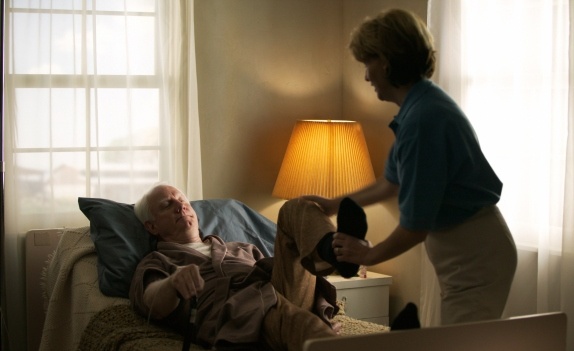

The Covid-19 pandemic cast a harsh light on nursing homes as a disproportionate number of the virus’s victims were residents of long-term care facilities. While Americans’ confidence in nursing homes may have declined as a result of the pandemic, the need for long-term care planning and funding remains.
Two new reports examine the likelihood of needing future care, and one offers suggestions on how advisers can use the pandemic as an opportunity to discuss the risks, costs and potential funding solutions for long-term care as a key part of a secure retirement plan.
“Because of Covid, health care and long-term care are top-of-mind issues for clients,” said Ron Mastrogiovanni, CEO of HealthView Services, a firm that provides health care cost projection software and services to financial institutions and advisers.
“I talk to advisers all the time, and they tell me that not only is the long-term care conversation easier to have now as a result of the pandemic, but it is often the clients who are bringing up the issue,” Mastrogiovanni said in an interview.
For older workers and retirees, the possibility of needing care later in life is a real concern. The problem is that no one knows who will need care, how severe the infirmity may be, or how long the need for care will last.
“Many people will experience only brief periods of needing care and the burden in terms of the money spent on formal caregivers or the time spent by informal caregivers will be minimal,” a new analysis by the Center for Retirement Research at Boston College found.
In the first of a three-part series of reports, the CRR projects the likelihood that 65-year-olds will experience disability over the course of their retirements and whether that disability will be manageable, catastrophic or somewhere in between.
“About one-fifth of retirees will need no support and one-quarter are likely to experience the type of severe needs that most people dread,” the report concluded. “In between these two extremes, 22% will have low needs and 38% will have moderate needs.” Long-term care needs vary by marital status, education, race and self-reported health.
Perhaps the CCR report’s most interesting finding is the very strong relationship between self-reported health at ages 65 to 70 and subsequent long-term care needs. Thirty percent of individuals who report their health as “excellent” or “very good” appear to escape any need for long-term care. That share drops to 18% for those who describe their health as “good” and to 5% for those who say their health is “fair” or “poor.”
Separately, a new report from HealthView Services presents the potential need for long-term care in different terms.
A healthy 65-year-old male/female couple has a 44% and 56% chance, respectively, of needing some level of long-term care if they each live to their actuarial life expectancies, according to the HVS report. Combined, there is a 75% probability that at least one spouse will need some form of end-of-life long-term care.
If both spouses need one year of long-term care — only a 25% probability —their projected combined costs are substantial: nearly $400,000 for nursing home care based on national average costs and future value, or about $223,000 for home care.
“Typically, home care is more desired than a nursing home and this sentiment may rise substantially in the future due to the Covid-19 pandemic,” the HVS report said. It noted that in 2020, national nursing home spending decreased by 7.8% while home health care spending rose by 6%.
Although home care is usually a less expensive option overall, it is the most expensive form of long-term care on an hourly basis. While costs for 44 hours of weekly care — an industry standard — may be manageable, expenses grow quickly as the need increases to 12 hours per day or more. In fact, if 24/7 care is required, home care is more than double the cost of a nursing home, the HVS report said.
“One certainty that has emerged from this pandemic is that individuals — and their advisers — must incorporate long-term care costs into comprehensive retirement saving plans,” Mastrogiovanni said. Potential funding solutions include stand-alone long-term care insurance, life insurance or annuities with a LTC rider, self-insuring, or a combination of approaches.
“Without proper planning, long-term care may become a significant burden on family members in terms of time, costs and emotion as many still mistakenly believe that Medicare fully covers LTC expenses,” Mastrogiovanni added.
[Questions about Social Security rules? Find the answers in Mary Beth Franklin’s ebook at Maximizing Social Security Retirement Benefits]

By listening for what truly matters and where clients want to make a difference, advisors can avoid politics and help build more personal strategies.

JPMorgan and RBC have also welcomed ex-UBS advisors in Texas, while Steward Partners and SpirePoint make new additions in the Sun Belt.

Counsel representing Lisa Cook argued the president's pattern of publicly blasting the Fed calls the foundation for her firing into question.

The two firms violated the Advisers Act and Reg BI by making misleading statements and failing to disclose conflicts to retail and retirement plan investors, according to the regulator.

Elsewhere, two breakaway teams from Morgan Stanley and Merrill unite to form a $2 billion RIA, while a Texas-based independent merges with a Bay Area advisory practice.
Orion's Tom Wilson on delivering coordinated, high-touch service in a world where returns alone no longer set you apart.
Barely a decade old, registered index-linked annuities have quickly surged in popularity, thanks to their unique blend of protection and growth potential—an appealing option for investors looking to chart a steadier course through today's choppy market waters, says Myles Lambert, Brighthouse Financial.
